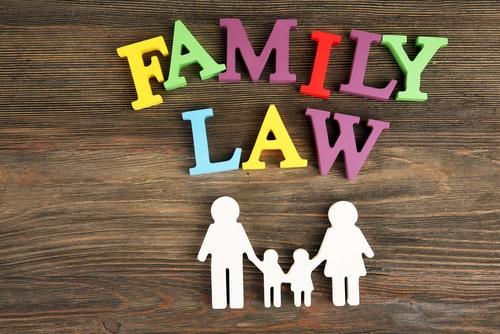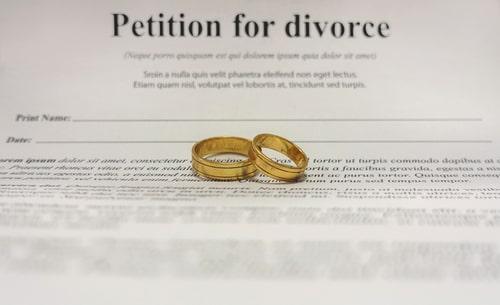Recent Blog Posts
Understanding Family Law: Safeguarding the Bonds that Matter
 Family law is a specialized branch of the legal system that governs aspects related to domestic affairs and familial relationships. It encompasses a range of legal issues that arise within families, from marriage and divorce to child custody, adoption, and even domestic violence. Today, we will aim to shed light on the crucial aspects and significance of family law, showcasing its pivotal role in preserving the well-being and stability of the modern family unit. If you need legal assistance with a family matter, contact a family lawyer today to ensure your legal goals can be satisfied.
Family law is a specialized branch of the legal system that governs aspects related to domestic affairs and familial relationships. It encompasses a range of legal issues that arise within families, from marriage and divorce to child custody, adoption, and even domestic violence. Today, we will aim to shed light on the crucial aspects and significance of family law, showcasing its pivotal role in preserving the well-being and stability of the modern family unit. If you need legal assistance with a family matter, contact a family lawyer today to ensure your legal goals can be satisfied.
Marriage and Divorce
A cornerstone of family law is the regulation of marriage and divorce. This includes procedures for obtaining a marriage license, the legal recognition of marriage between partners, and the dissolution of marriage through divorce. Family law attorneys play a crucial role in guiding couples through the complexities of divorce, such as asset division, spousal support, and child custody arrangements.
What is the Difference Between Orders of Protection and Restraining Orders in Illinois?
 When there is tension or violence in a relationship, obtaining an order of protection or a restraining order in Illinois can be an effective legal way to establish limits and safety. Although similar in nature, the two have significant differences. As a result, if you are interested in pursuing either an order of protection or a restraining order, contact a family law attorney to learn more about what each option entails and which may be right for you.
When there is tension or violence in a relationship, obtaining an order of protection or a restraining order in Illinois can be an effective legal way to establish limits and safety. Although similar in nature, the two have significant differences. As a result, if you are interested in pursuing either an order of protection or a restraining order, contact a family law attorney to learn more about what each option entails and which may be right for you.
Restraining Orders
Contrary to what many believe, temporary restraining orders are designed primarily to protect financial assets during divorce proceedings under Illinois law. When a divorce is taking place, a restraining order can prohibit a spouse from taking, selling, or otherwise disposing of jointly controlled property or assets. An example of a scenario where a financial restraining order may be necessary could be to prevent a spouse from canceling a critical insurance policy. In Illinois, restraining orders are usually used in divorce cases instead of domestic violence cases, but not always.
What You Need to Know About Establishing Paternity in Illinois
 Establishing paternity is an important process for both parents and children in Illinois. Without establishing paternity, fathers may not have the same rights as mothers, and children are not entitled to the same legal protections and benefits. Today, we will discuss what is most important to know about paternity in Illinois. If you have questions related to paternity, contact a family law attorney to understand your legal options at this time.
Establishing paternity is an important process for both parents and children in Illinois. Without establishing paternity, fathers may not have the same rights as mothers, and children are not entitled to the same legal protections and benefits. Today, we will discuss what is most important to know about paternity in Illinois. If you have questions related to paternity, contact a family law attorney to understand your legal options at this time.
Essential Considerations for Paternity in Illinois
In Illinois, paternity can be established in a few different ways, including:
- Through marriage – If a man and woman are married and a baby is born, the man will legally be considered the father.
- Voluntary acknowledgment of paternity – This method involves both parents signing a voluntary acknowledgment of paternity (VAP) form at the hospital or birthing center where the child was born. This can also be done at a later time as long as both parents agree to it
Debunking the Common Myths of Premarital Agreements
 Premarital agreements, commonly referred to as prenuptial agreements, are contracts between two individuals planning on getting married. The agreement defines how the couple's assets and liabilities will be divided in the event of a divorce. Despite their growing popularity, many myths exist regarding premarital agreements. It is essential to debunk these myths to see whether a premarital agreement may suit you and your situation. Remember, if you are interested in a premarital agreement, contact an experienced family law attorney to learn more and see whether signing one may be in your best interest.
Premarital agreements, commonly referred to as prenuptial agreements, are contracts between two individuals planning on getting married. The agreement defines how the couple's assets and liabilities will be divided in the event of a divorce. Despite their growing popularity, many myths exist regarding premarital agreements. It is essential to debunk these myths to see whether a premarital agreement may suit you and your situation. Remember, if you are interested in a premarital agreement, contact an experienced family law attorney to learn more and see whether signing one may be in your best interest.
The Most Common Misconceptions Regarding Premarital Agreements
- Premarital agreements are only for the wealthy – While premarital agreements are commonly associated with wealthy individuals and celebrities, they are not exclusively for the rich. Anyone can enter into a premarital agreement, regardless of their financial situation. In fact, premarital agreements can benefit those who have children from another marriage or own a business.
What Are the Laws in Illinois Regarding Alimony?
 When people are divorcing, there are many financial concerns to contend with, including alimony or spousal maintenance. Judges in Illinois must consider whether one spouse merits receiving payments from the other spouse for any period of time during or after a divorce.
When people are divorcing, there are many financial concerns to contend with, including alimony or spousal maintenance. Judges in Illinois must consider whether one spouse merits receiving payments from the other spouse for any period of time during or after a divorce.
Spousal support in Illinois is generally either temporary or long-term. Temporary support may last only through the divorce process while long-term support will last much longer.
Long-term maintenance can also be fixed-term, indefinite, or reviewable. Fixed-term maintenance means a court establishes a date on which support will end, indefinite maintenance means that payments will continue unless an award is modified or terminated, and reviewable maintenance means a court will retain the right to revisit the award and modify it later.
Amount and Duration of Spousal Maintenance
Not every divorce case involves a spousal maintenance order. Spousal maintenance decisions are usually based on a combination of different factors, including the needs of both spouses, the duration of the marriage, each spouse’s income, assets, and debts, the standard of living established during the marriage, the receiving spouse’s current and future earning capacity, constraints on either spouse’s earning capacity, the effect of child custody and placement arrangements on a spouse’s ability to maintain employment, and any other factors that a court finds to be just and equitable.
How to Choose an Attorney For My Illinois Divorce?
 Ending a marriage can be an especially difficult and often confusing time. Even if a divorce is the best option for you and your spouse, it can still be a challenge to navigate the process. Hiring a divorce attorney is the best way to ensure you have access to the legal support you need. Your lawyer will guide you through the divorce every step of the way and help you step into the next chapter of your life.
Ending a marriage can be an especially difficult and often confusing time. Even if a divorce is the best option for you and your spouse, it can still be a challenge to navigate the process. Hiring a divorce attorney is the best way to ensure you have access to the legal support you need. Your lawyer will guide you through the divorce every step of the way and help you step into the next chapter of your life.
But how can you pick the attorney best for you? There are many different things to keep in mind. With the added benefit of modern technology and the internet, researching is made easy so you can find the right fit for your needs.
What Type Of Attorney Do I Need?
There are many different types of law that can be practiced. In the case of divorce, a law firm that handles family law is what you will want. There are many different complexities involved in marriage dissolution cases, and knowledge of family law is essential.
Positive Co-Parenting Following an Illinois Divorce
 As a new year rolls in, many of us are looking to start the year fresh and better ourselves during 2023. Though working on yourself is always a positive thing, it can be difficult for those of us who have recently gone through a divorce. If you and your former spouse have children together, it can be especially challenging to remain positive and resilient in the new year. But with some patience and understanding, you and your former spouse can work on your relationship in a constructive manner for the benefit of your children.
As a new year rolls in, many of us are looking to start the year fresh and better ourselves during 2023. Though working on yourself is always a positive thing, it can be difficult for those of us who have recently gone through a divorce. If you and your former spouse have children together, it can be especially challenging to remain positive and resilient in the new year. But with some patience and understanding, you and your former spouse can work on your relationship in a constructive manner for the benefit of your children.
How Can I Keep Positive?
Though it may go against your instincts to talk positively towards and about your former spouse, this will have a large impact on your child’s view of the parent. Young children are highly impressionable and what you say has a big influence on how they will feel and act in the future. Illinois Courts tend to lean in favor of keeping both parents involved in children’s lives as much as possible.
Can I Get an Annulment for my Kane County Marriage?
 If you are looking to end your marriage, you may qualify for an annulment. Though an annulment is not the same as a divorce, it is another legal way to end a marriage. Technically, an annulment, called a Judgment of Invalidity of Marriage, asserts that a marriage was never valid to begin with. Specific requirements must be met for an annulment to be an option.
If you are looking to end your marriage, you may qualify for an annulment. Though an annulment is not the same as a divorce, it is another legal way to end a marriage. Technically, an annulment, called a Judgment of Invalidity of Marriage, asserts that a marriage was never valid to begin with. Specific requirements must be met for an annulment to be an option.
What Is an Annulment?
The state of Illinois views an annulment as the invalidity of a supposed marriage. This would mean that the marriage itself would be voided from the date of the marriage. In a divorce, the marriage is dissolved but an annulment invalidates the marriage altogether. There are only a select few circumstances that can qualify a marriage to be annulled:
- If one or both parties were under 18 at the time of the marriage, and therefore, under the legal age of consent, and did not have any consent from a guardian or the courts.
How is Custody Determined in an Illinois Divorce?
 One of the most difficult decisions in a divorce is deciding who is granted custody over the children. If you and your spouse can reach a parenting plan outside of court, then things can remain comparatively less complicated. Oftentimes, however, a judgment must be passed within the courts to resolve the issue. There are many factors that are weighed when reaching the final decision. Having an experienced attorney in your corner is your best advantage when faced with the challenges of custody battles and divorce.
One of the most difficult decisions in a divorce is deciding who is granted custody over the children. If you and your spouse can reach a parenting plan outside of court, then things can remain comparatively less complicated. Oftentimes, however, a judgment must be passed within the courts to resolve the issue. There are many factors that are weighed when reaching the final decision. Having an experienced attorney in your corner is your best advantage when faced with the challenges of custody battles and divorce.
Important Factors Courts Consider When Deciding Custody
The Illinois Court system will typically attempt to settle for a shared custody plan for the spouses. As long as both parents can prove they have a stable home, the parenting plan will attempt to keep both parents in the children’s lives. The primary factors that the courts will look at when determining the custody can include:
Navigating a Changing Household During Divorce in Kane County
 Divorce can be a challenging period of life for all parties involved. This can be compounded if the couple filing shares underage children. Though it can be easy to get swept up in your emotions and remain distracted by all the legal proceedings and unexpected life changes, it is imperative to continue to give extra support and attention to your children during divorce. Van Larson Law focuses on navigating you through your divorce in the most effective and stress-free manner. A significant aspect of that is providing you with the resources available to help your children during the transition.
Divorce can be a challenging period of life for all parties involved. This can be compounded if the couple filing shares underage children. Though it can be easy to get swept up in your emotions and remain distracted by all the legal proceedings and unexpected life changes, it is imperative to continue to give extra support and attention to your children during divorce. Van Larson Law focuses on navigating you through your divorce in the most effective and stress-free manner. A significant aspect of that is providing you with the resources available to help your children during the transition.
Five Tips for Helping Children Adjust During Divorce
During a divorce, children undergo many changes very rapidly. These changes in a child’s life can result in adverse childhood experiences. Adverse childhood experiences, or ACEs, can be traced to be the root of many challenging health and social problems later in life. A parent’s need to provide for and protect their children always comes as a top priority, but it can be difficult for one person to juggle all of the changes in their own life while giving the proper attention and support to their children. It could also be uncharted territory for the parent and they may be unsure of how to navigate the shift in their daily routine.
Location
233 W. Wilson Street
Batavia, IL 60510Mon – Fri: 8AM–5PM
Weekends and evenings by appointment. All phone calls and emails promptly and personally responded to and advise if emergency.Phone: (630) 879-9090
Contact us
NOTE: Fields with a * indicate a required field.****



